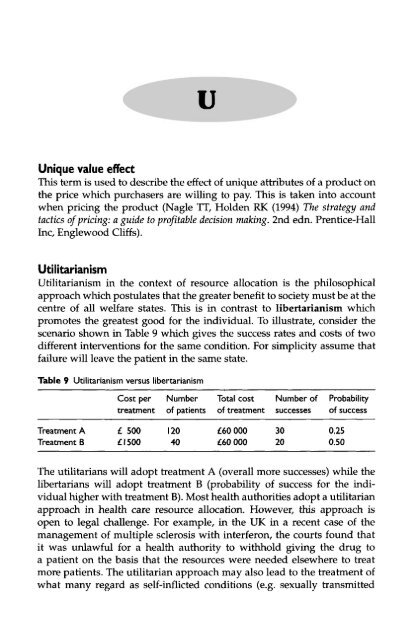Dictionary of Evidence-based Medicine.pdf
Dictionary of Evidence-based Medicine.pdf
Dictionary of Evidence-based Medicine.pdf
Create successful ePaper yourself
Turn your PDF publications into a flip-book with our unique Google optimized e-Paper software.
u<br />
Unique value effect<br />
This term is used to describe the effect <strong>of</strong> unique attributes <strong>of</strong> a product on<br />
the price which purchasers are willing to pay. This is taken into account<br />
when pricing the product (Nagle TT, Holden RK (1994) The strategy and<br />
tactics <strong>of</strong> pricing: a guide to pr<strong>of</strong>itable decision making. 2nd edn. Prentice-Hall<br />
me, Englewood Cliffs).<br />
Utilitarianism<br />
Utilitarianism in the context <strong>of</strong> resource allocation is the philosophical<br />
approach which postulates that the greater benefit to society must be at the<br />
centre <strong>of</strong> all welfare states. This is in contrast to libertarianism which<br />
promotes the greatest good for the individual. To illustrate, consider the<br />
scenario shown in Table 9 which gives the success rates and costs <strong>of</strong> two<br />
different interventions for the same condition. For simplicity assume that<br />
failure will leave the patient in the same state.<br />
Table 9 Utilitarianism versus libertarianism<br />
Cost per<br />
treatment<br />
Number<br />
<strong>of</strong> patients<br />
Total cost<br />
<strong>of</strong> treatment<br />
Number <strong>of</strong><br />
successes<br />
Probability<br />
<strong>of</strong> success<br />
Treatment A<br />
Treatment B<br />
£ 500<br />
£1500<br />
120<br />
40<br />
£60 000<br />
£60 000<br />
30<br />
20<br />
0.25<br />
0.50<br />
The utilitarians will adopt treatment A (overall more successes) while the<br />
libertarians will adopt treatment B (probability <strong>of</strong> success for the individual<br />
higher with treatment B). Most health authorities adopt a utilitarian<br />
approach in health care resource allocation. However, this approach is<br />
open to legal challenge. For example, in the UK in a recent case <strong>of</strong> the<br />
management <strong>of</strong> multiple sclerosis with interferon, the courts found that<br />
it was unlawful for a health authority to withhold giving the drug to<br />
a patient on the basis that the resources were needed elsewhere to treat<br />
more patients. The utilitarian approach may also lead to the treatment <strong>of</strong><br />
what many regard as self-inflicted conditions (e.g. sexually transmitted










